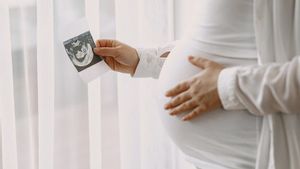JAKARTA - The British government on Thursday said they were concerned that a newly identified coronavirus variant spreading in South Africa, could make a vaccine less effective and jeopardize the progress made around the world in fighting the pandemic.
The UK's Health Safety Administration said the variant, called B.1.1.529 - had a spike protein that was dramatically different from that of the original coronavirus on which the COVID-19 vaccine was based.
Officials characterized the variant, which has twice the number of mutations as the currently dominant Delta variant, as "worst".
This variant was only first identified at the start of the week, but the UK rushed to introduce travel restrictions in South Africa and five neighboring countries, acting much more quickly than with the previous variant.
"What we do know is that there is a large number of mutations, probably double the number of mutations we saw in the Delta variant," Health Minister Sajid Javid said, citing Reuters on November 26.
"And that would suggest that it may be more infectious and the current vaccine that we have may be less effective."
In this regard, the UK announced it is temporarily banning flights from South Africa, Namibia, Botswana, Zimbabwe, Lesotho, and Eswatini from 1200 GMT on Friday, with UK travelers returning from those destinations subject to quarantine.
Minister Javid said more data was needed but travel restrictions were needed as a precaution, as scientists said laboratory studies were needed to assess the possibility of mutations resulting in greatly reduced vaccine efficacy.
Officials have informed the government of the need to act quickly and pre-emptively if concerns about the impact of the variant arise, although it may take weeks to produce all the necessary information on its characteristics.
Earlier on Thursday, South African scientists said they had detected a small number of the new COVID-19 variant and were working to understand its potential implications.
SEE ALSO:
This variant has also been found in Botswana and Hong Kong, but the UK's Health Safety Administration said that no cases of the variant had been detected in the UK.
"Preliminary evidence from genomic surveillance in South Africa suggests B.1.1529 is a serious cause for concern," said Ewan Birney, deputy director-general of the European Laboratory of Molecular Biology.
"We know early action is much better than late action. Perhaps the threat of this variant is not as big as Alpha and Delta, but the potential consequences of not acting on that possibility could be serious," he concluded.
The English, Chinese, Japanese, Arabic, and French versions are automatically generated by the AI. So there may still be inaccuracies in translating, please always see Indonesian as our main language. (system supported by DigitalSiber.id)


















